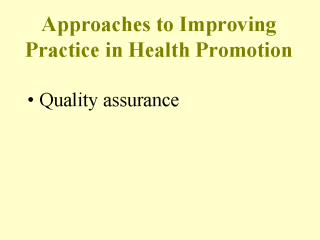 |
- The European
health promotion community, especially in the United Kingdom are already into the field of
Quality Assurance in a big way, partly stimulated by the "provider-purchaser
split" in the UK. There have in fact been several health promotion conferences on
this topic in Europe over the past few years and a book by Davies and Macdonald (1998) .
Moreover, the European Committee for Health Promotion Development sponsored by the WHO
Regional Office for Europe has done quite a bit of work on this issue and as a
consequence, we have a paper by Richard Parish summarizing that work in the WHO Evaluation
book (www.who.dk/InformationSources/Catalogue/20010911_43) -
Recognizing this trend, our own Centre carried out a one-year project to investigate the
concept of Continuous Quality Improvement in relation to health promotion in the context
of our work with practitioners. Our conclusions are summarized in a couple of publications
( Kahan and Goodstadt,1999; Rootman, 1997), so I'm not going to go into this in detail. We
did however conclude that the concept was relevant to health promotion, albeit with some
reservations and modifications. Nevertheless, we abandoned this approach in favor of a
"best practices" approach because the practitioners that we were working with
felt somewhat uncomfortable in adopting this terminology in health promotion, possibly
because of its association with the commercial world |
